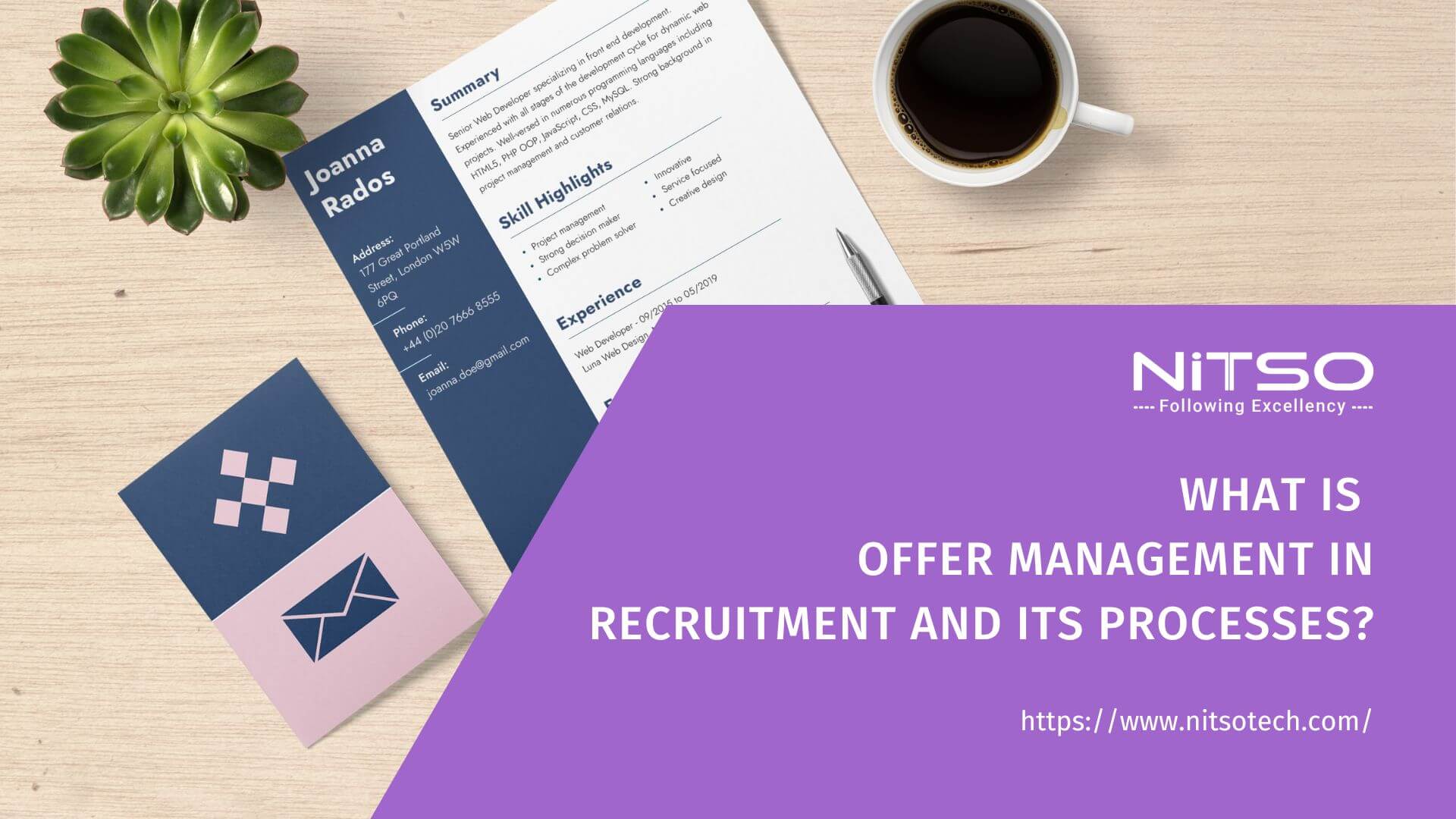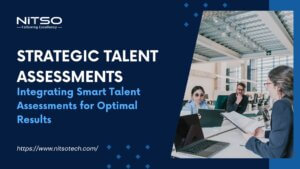Landing a top candidate in a competitive hiring market often comes down to the offer management process. How you extend offers, negotiate terms, and communicate with candidates can be the difference between a rejected offer and a signed acceptance letter. This makes strategically managing job offers a crucial recruitment capability.
In this comprehensive guide, we’ll dive into what is offer management in recruitment and why it’s important for hiring success. We’ll break down the key stages of the offer management process, techniques for impressing star candidates, and common mistakes to avoid. Follow along for insights on levelling up your offer management to attract top talent.
Table of Contents
What is Offer Management in Recruitment?
Offer management is a critical component of the recruitment process that occurs after a hiring manager has selected their preferred candidate. It involves presenting the candidate with a job offer, negotiating the terms of employment if needed, and securing final acceptance of the offer. Effective offer management in recruitment ensures the company can efficiently hire qualified candidates in a competitive talent market.
The Main Goals of Offer Management in Recruitment are to:
- Successfully extend job offers to desired candidates in a clear and appealing way. The offer should effectively communicate details like compensation, benefits, job responsibilities, and the excitement of hiring the candidate.
- Negotiate any offer terms professionally if the candidate asks for adjustments like higher pay or more vacation time. This may involve collaborating with HR on assessing requests and staying within budget. Quick and fair responses demonstrate the company’s flexibility and interest in the candidate.
- Ensure all offers comply with relevant laws and regulations. There are legal standards around presenting offers, like not asking candidates about their salary history in certain states. Keeping offers consistent also promotes fairness between candidates.
- Secure prompt acceptance of the offer. Following up and guiding the candidate through acceptance paperwork keeps them engaged through their start date. Declining counteroffers gracefully preserves a positive employer brand.
- Protect confidential offer information. Companies should only share details like salaries with those involved in presenting an offer to a candidate. Honouring candidates’ privacy promotes trust in the process.
With strategic planning and execution, offer management allows recruiters and hiring managers to attract top talent by extending compelling offers in an organized manner. Candidates are more likely to accept offers and join companies that demonstrate professionalism and enthusiasm during this critical recruitment stage.
Importance of Offer Management in Recruitment
Effective offer management while recruiting provides a number of benefits that enable organizations to attract and hire desired candidates:
- Reduces Offer Rejection Rates: A strategic offer management process influences candidates to accept job offers. Compelling compensation and benefits, quick follow-ups, and expressing excitement to hire all promote offer acceptance. When offers are extended professionally with attention to detail candidates want, they are less likely to pursue other opportunities.
- Promotes Positive Employer Brand: The offer process significantly impacts a candidate’s view of an employer. Prompt responses, fairness, and transparency around offer terms give candidates a positive experience. Even if negotiations are required, keeping things friendly and organized demonstrates that the company values the candidate. This strengthens the employer brand.
- Enables Hiring Managers to Secure Top Talent Within Budget: Offer management empowers recruiters and hiring managers to navigate job offers and negotiations while staying within budget. HR guidelines on compensation ranges keep offers competitive for top talent without overspending. Compliance practices also reduce risk.
- Creates Legal Protection Around Offers: Proper offer management in recruitment is crucial for legal protection and compliance. Documenting offer details in writing and limiting access to confidential offer information reduces exposure to lawsuits. Keeping offers consistent between candidates also avoids discrimination claims.
A smooth, professional offer experience can frequently make the difference between a rejected offer and a signed acceptance from a top candidate.
Article you might be interested in Transform Your Hiring with an Efficient & Effective Process
Offer Management Processes in Recruitment
The key stages of the offer management process are extending the initial offer, negotiating terms, closing the acceptance, and ensuring compliance.
Extending the Initial Offer
Crafting the initial offer is the first critical step. Key actions include:
- Determining Details: Work with HR to decide on offer components like salary, signing bonus, relocation assistance, stock options, and benefits. Ensure the offer is attractive based on role research, company ranges, and candidate expectations.
- Securing Approvals: Seek proper approvals from HR and the hiring manager before presenting the offer. This ensures alignment on offer terms.
- Presenting Enthusiastically: Extend the offer to the candidate promptly with enthusiasm, ideally by phone. Provide key details like compensation, benefits, start date expectations, and excitement about their joining. Follow up in writing for documentation.
Negotiating Terms
Discussions about offer adjustments like higher salary or more vacation time are common. Effective negotiation strategies include:
- Anticipating Questions: Be ready to explain and stand firm on certain offer components if needed.
- Responding Timely: Address candidate inquiries and negotiation requests promptly to keep momentum. Signs of disinterest can lead them to lose interest.
- Collaborating with HR: Consult HR on assessing candidates’ requests for different salary, equity, relocation or other terms.
- Staying Within Budget: While some flexibility is reasonable, avoid going outside predefined offer ranges too much.
Closing the Acceptance
Once terms are finalized, closing the offer acceptance involves:
- Confirming Details: Document final offer terms in a written agreement if any details were negotiated.
- Managing Paperwork: Guide the candidate through signing the offer letter, forms, and all necessary paperwork.
- Maintaining Engagement: Keep the candidate feeling welcomed and excited about starting through the notice period before their start date.
- Declining Counteroffers: Should the candidate receive a counteroffer, politely decline while expressing a desire to hire the candidate.
Ensuring Compliance
Compliance is critical throughout the process:
- Follow Laws: Understand and comply with applicable laws around presenting job offers.
- Promote Fairness: Be consistent in offers within the same role to avoid unfairness or discrimination claims.
- Honour Privacy: Only share a candidate’s offer details with those essential for presenting and approving the offer.
Following structured offer management processes with legal and budget considerations in mind enables organizations to effectively motivate top talent to accept job offers.
What are the Offer Management Strategies for Recruiting Top Talent?
Extending offers and managing negotiations is often the most critical stage for convincing star candidates to join your organization. Some effective strategies include:
- Offer Compelling Compensation and Benefits: Conduct market research and have attractive base salaries, bonuses, equity, and a strong benefits package prepared. Top candidates have options and expect strong compensation.
- Emphasize Company Culture and Values: Convey your company’s positive work environment, growth opportunities, and how the candidate can thrive there. This draws candidates to the non-monetary aspects of the role.
- Maintain Regular Communication: Provide frequent status updates to candidates throughout the process. Strong communication sets positive expectations.
- Convey Enthusiasm About the Candidate: Express excitement and eagerness to have the candidate join your team during offer discussions. This makes them feel valued.
- Respond Swiftly to Inquiries: Answer candidate questions and pause timely during negotiations. Slow responses can lead top talent to lose interest or pursue other offers.
- Customize Perks: Include unique perks like signing bonuses, work-from-home options, or professional development funds to meet a candidate’s needs.
- Prioritize Speed: Extend offers quickly before competitors do. Top talent is in high demand, so delays can mean missed opportunities.
With strategic offer management tailored to impress star candidates, you can tip the scales to win top talent over your competitors. The offer process is your chance to show candidates why your company is the clear choice for the next step in their career.
Article you might be interested in 7 Key Talent Acquisition Strategies for Better Hiring
What are the Mistakes to Avoid in Offer Management While Recruiting?
While a strong offer management process is crucial for hiring success, there are also pitfalls to avoid:
- Presenting Offers with Errors or Lack of Details – Typos, missing information, or disorganization in the offer can convey a lack of interest in the candidate. Ensure accuracy and provide a comprehensive view of compensation and benefits.
- Letting Negotiations Drag On Without Follow-Up – Quick follow-up and closure during negotiations are key to keeping candidates engaged. Leaving inquiries unanswered for long periods can lead candidates to lose interest or take another offer.
- Failing to Get Necessary Approvals – Extending offers without sign-off from HR or the hiring manager risks confusion and mismatched expectations during onboarding. Follow protocols.
- Not Responding Promptly to Candidate Questions – Candidates often have lots of important questions about offers. Delayed responses give the impression you lack enthusiasm or interest.
- Making Offers Outside of Guidelines or Budget – Straying too far from HR offer guidelines or overspending can lead to problems. Honour guardrails around offer terms and compensation levels.
- Forgetting Legal Best Practices – Improper offer management in recruitment can expose the company to legal risks around discrimination, unfairness, or labour regulations. Consult HR to ensure compliance.
- Neglecting the Candidate Experience – Overlooking the human aspect of offers and treating it as a transaction can lead candidates to decline offers. Maintain open and friendly communication.
Avoiding these common missteps will help management run smoothly. With preparation, collaboration, compliance, and a candidate-centric approach, organizations can master this critical stage in recruiting top talent.
Article you might be interested in Strategic Talent Assessments: Elevating Volume Hiring to Excellence
Key Insights
With the right strategies and attention to detail, offer management in recruitment enables hiring teams to motivate their preferred candidates to say yes. A structured process, compelling offer terms, strong communication, and legal compliance all work together to convey an employer’s genuine interest and convince talent to join. Avoiding missteps and delays retains candidates’ enthusiasm through their start date.
By investing time into perfecting the offer management process, companies can repeatedly turn top candidates into valued employees. The offer process sets the stage for an employee’s entire tenure at a company. Mastering these best practices will empower hiring managers to build world-class teams by securing in-demand talent.
Article you might be interested in Winning the War for Talent: A Strategic HRM Selection Process
FAQs Related to Offer Management in Recruitment
What is offer management in recruitment?
Offer management is the stage in the recruiting process where a company extends a job offer to a candidate, negotiates terms if needed, and secures acceptance of employment from the candidate.
What is the offer management process?
The offer management process has several key stages. First, the recruiter and HR collaborate to determine the offer details, including compensation, benefits, job responsibilities, and start date based on the role and candidate. Once the offer is crafted, the recruiter secures necessary approvals from HR and hiring managers before extending the offer enthusiastically to the candidate, ideally by phone with follow-up in writing. If the candidate asks to negotiate on offer terms, the recruiter works closely with HR to discuss adjustments like salary or equity while staying within budget. When final terms are agreed upon, the recruiter confirms offer details in an offer letter and guides the candidate through signing paperwork to formally accept the job. Throughout the process, the recruiter ensures compliance with employment laws and regulations while maintaining positive, regular communication to keep the candidates engaged leading up to their start date. Following structured offer management processes leads to hiring success by motivating desired candidates to say yes.
What is offer management?
Offer management is the process of extending job offers, negotiating terms, and securing acceptance of employment from desired candidates.
When does offer management occur?
The offer management is the last stage of the recruiting process after the hiring manager has selected their chosen candidate.
What are the main parts of offer management?
The key parts are crafting and extending the offer, discussing any negotiations on terms, confirming acceptance, and maintaining compliance.
Why is offer management important?
Effective offer management ensures candidates positively view the hiring process and are motivated to accept jobs and join the company.
What should be included in a job offer?
Offers should cover compensation details, benefits, job responsibilities, start date, and enthusiasm about the candidate joining.
How can companies stand out during offer management?
Customized perks, compelling pay, strong communication, and speed create a positive offer experience that impresses candidates.
What are common offer management mistakes?
Errors in offers, delaying responses, going over budget, and neglecting legal protocols are some major mistakes to avoid.
How can offer management promote diversity hiring?
Fair, consistent offers and processes for all candidates, regardless of race, gender, etc. ensure diverse and inclusive talent acquisition.








0 Comments